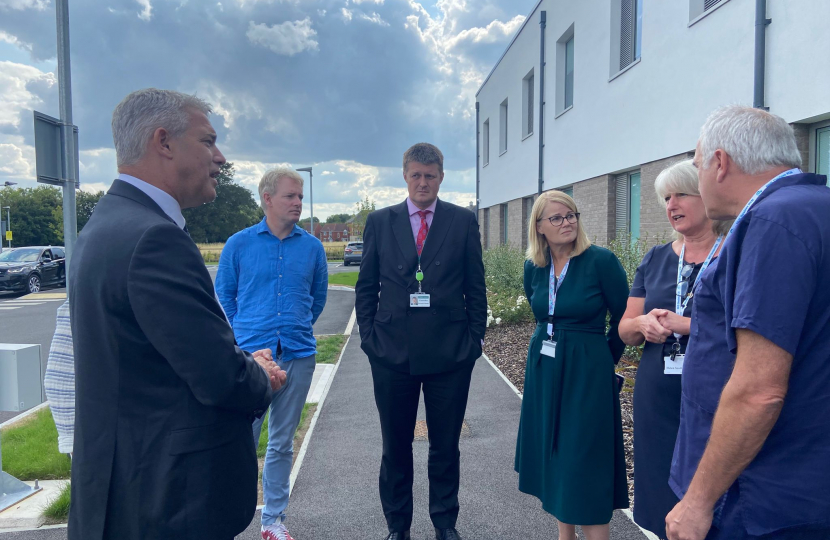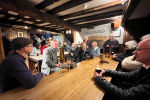
Forgive a party-political newsletter for once. Parliament ‘rose’ last week for the summer recess. It was a bad week politically for the Tories, with two formerly safe seats lost in by-elections (in Somerset and Yorkshire) and a very near miss in Uxbridge, west London. I agree with the commentators who say the surprising result in Uxbridge shows that voters are not ‘nailed on’ to vote Labour at the General Election; that when the Conservatives present a coherent, authentic alternative on an issue that matters to people - in this case, the cost of driving - they will overlook our recent shortcomings and back us.
The collapse in the Tory vote in Somerset and Yorkshire - places not unlike Wiltshire - reflects a genuine sense of confusion about what the Conservatives stand for after 13 years in office. In London, Labour’s implicit disregard for ordinary working people is obvious in the extension of the congestion charge to the outer suburbs. In Uxbridge, therefore, we were able to run as the opposition to the governing party - the Labour Mayor. Elsewhere in the country, though there are Labour and Lib Dem councils cooking up similar anti-motorist schemes as Sadiq Khan, we have a more challenging job: offering an alternative to the status quo, when we are ourselves in government.
It sounds paradoxical but the priority for Conservatives really should be to campaign as the party of change. Only Conservatives have the courage and the philosophy to take on the forces that are harming ordinary families and businesses, hollowing out local communities and weakening the nation.
What are these forces? Tragically, they are the institutions, or big parts of them, which once stood up for the values and interests of the majority of the country: parts of the civil service, the judiciary, the BBC, and even the banks. None of the people working in these institutions - and as an MP I come across a lot of them - are bad or wish Britain ill: quite the reverse; they are generally self-consciously virtuous people who think they are doing the Right Thing. The problem is that they have been captured by an ideology that is hostile to the opinions and harmful to the wellbeing of ordinary people; and that the incentive structures they are in (cultural, professional, financial) all reinforce the hostility and harm.
The business of Nigel Farage’s bank account is a classic of the genre. The story really begins a year ago when PayPal, the payments service provider, summarily closed the accounts of various dissident campaigners including the Free Speech Union and the anti-lockdown group Us For Them. I was the first MP to raise the matter in Parliament (see here). Since then the Government has been working diligently to revise the rules. The revelations about NatWest’s treatment of Mr Farage has brought this process to a head and I am very glad that ministers have been properly robust about the unacceptability of banks - private businesses which nevertheless provide an essential and regulated service for all citizens - withdrawing services from people they disapprove of. I quizzed the Financial Conduct Authority on the matter at the Treasury Select Committee (see here).
The Government gets it; Labour doesn’t. The same goes for another great issue of the moment, illegal migration. Here, the Prime Minister this week correctly identified the problem as ‘the Labour Party, a subset of lawyers, criminal gangs - they're all on the same side, propping up a system of exploitation that profits from getting people to the UK illegally.’ He wasn’t suggesting Labour actively want to help criminal gangs exploit vulnerable migrants; but the effect of their refusal to remove illegal entrants, which is the only possible way to stop the people traffickers, means that’s what they’re doing.
Our opponent is what William Cobbett in the early 19th century called ‘the Thing’: the nexus of established power, that under the veneer of virtue pursues policies that are bad for the people of the country. Paul Goodman put it well this week in Conservative Home.
I mention all this because since I last wrote I helped launch a new political initiative with a group of Conservative MPs elected since the 2016 Brexit referendum. For this reason we call ourselves the ‘New Conservatives’: not because there’s anything (especially) wrong with the Old sort, but because we represent the great realignment in our politics that Brexit, and our victory in the 2019 election, has ushered in. The public want to take back control of their country, and they expect their government to act with their values and their interests in mind. One way or another, the Thing will be opposed and defeated. Our argument is that the Conservative Party is the best possible vehicle to lead that opposition. But the Party needs to do so deliberately - as it appears the PM is increasingly minded to do. You can read more about the New Conservatives, and sign up to receive updates, on our website here.
Enough politics! I’ve been busy trying to represent the shooting community of Salisbury Plain in their battle with the Thing, namely Defra and Natural England, who suddenly stopped the Army shoots from releasing their birds this summer - with potentially disastrous consequences not just for the shoots and the many many people who benefit from them, but the ecology of Salisbury Plain too. I wrote about it all here.
I was delighted last week to welcome Steve Barclay, the Health Secretary, to Devizes to visit the brilliant new Health Centre which opened this year after a long lobbying operation by local doctors, supported by my predecessor Claire Perry O’Neill, and by me. It’s a genuinely world-class facility. See a short video of my conversation with Steve and with Dr Richard Stanford-Hill, here.

Wadworth brewed its famous 6X for the first time 100 years ago this autumn, at its now-historic brewery in the middle of Devizes. I visited the new brewery site on Folly Road, on the edge of town, last week for a tour with Toby Bartholomew, the boss, plus his chief brewer and chief engineer. It’s not up and running yet but it was great to see the gleaming steel state-of-the-art new pipes and vats and what-have-you (all made in Germany, sadly; the British suppliers were asking double the prices). We also discussed the plans for the old site in the town centre, by the canal - there is a huge opportunity for the renewal of Devizes here, and it’s important the new developers take on board the concerns of local people about how the site will look and work for the next phase of its life.

Thinking of William Cobbett I was inspired to look up what he wrote about Wiltshire in his famous Rural Rides (1826). ‘The shepherd showed me the way towards Milton [Lilbourne, I presume]; and at the end of about a mile, from the top of a very high part of the down, with a steep slope towards the valley, I first saw this Valley of Avon; and a most beautiful sight it was! Villages, hamlets, large farms, towers, steeples, fields, meadows, orchards, and very fine timber trees, scattered all over the valley…I never before saw anything to please me like this valley of the Avon. I sat upon my horse and looked over Milton and Easton and Pewsey for half an hour, though I had not breakfasted.’
In the same passage Cobbett inveighs against transportation of the ‘surplus’ population (and ‘the monster Malthus’, who thought England was full) so he would probably not support my party’s policy on illegal migrants. But thankfully the Pewsey Vale is still recognisable as the one he rode through. We have much to be thankful for in our temperate corner of the world, as southern Europe burns.




